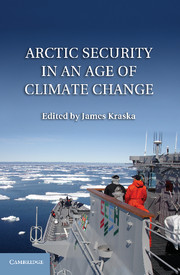Book contents
- Frontmatter
- Contents
- Figures and Tables
- Contributor Biographies
- Foreword
- Part I Introduction: Circumpolar Perspectives
- Part II European Security Interests in the Arctic
- Part III North American Security Interests in the Arctic
- 12 Canada and the Newly Emerging International Arctic Security Regime
- 13 Polar Race or Polar Saga?
- 14 The New Arctic Geography and U.S. Strategy
- 15 Arctic Security Considerations and the U.S. Navy's ???Arctic Roadmap???
- Afterword
- Index
- References
15 - Arctic Security Considerations and the U.S. Navy's ???Arctic Roadmap???
Published online by Cambridge University Press: 07 September 2011
- Frontmatter
- Contents
- Figures and Tables
- Contributor Biographies
- Foreword
- Part I Introduction: Circumpolar Perspectives
- Part II European Security Interests in the Arctic
- Part III North American Security Interests in the Arctic
- 12 Canada and the Newly Emerging International Arctic Security Regime
- 13 Polar Race or Polar Saga?
- 14 The New Arctic Geography and U.S. Strategy
- 15 Arctic Security Considerations and the U.S. Navy's ???Arctic Roadmap???
- Afterword
- Index
- References
Summary
Introduction
Arctic sea-ice melting associated with global climate change has caused leaders from the United States and the international community to reconsider the national security implications of the region. Taking into account nearly a century of experience in the Arctic, new national policy, existing strategy, and geopolitical implications of the changing environment, the U.S. Navy has developed the Arctic Roadmap, which will guide policy, investment, and action regarding the region. With key themes of improved environmental understanding, informed investments, increased experience, cooperative partnerships, and support for the UN Convention on the Law of the Sea, the Arctic Roadmap is meant to ensure navy readiness and capability and result in recognition of the navy as a valued partner by the joint, interagency, and international communities.
the changing arctic environment
The Arctic has long been a dynamic and harsh environment in which virtually all maritime operations have been hazardous, if not impossible. Yet traditional views of the Arctic as a nonnavigable region are beginning to shift. Relative to the 1970s, the Earth's temperature has increased sufficiently to cause significant melting of glaciers and diminishment in Arctic sea ice. The prevailing and well-established scientific view attributes this temperature change to anthropogenic emissions of “greenhouse” gases.
- Type
- Chapter
- Information
- Arctic Security in an Age of Climate Change , pp. 267 - 280Publisher: Cambridge University PressPrint publication year: 2011
References
- 2
- Cited by



